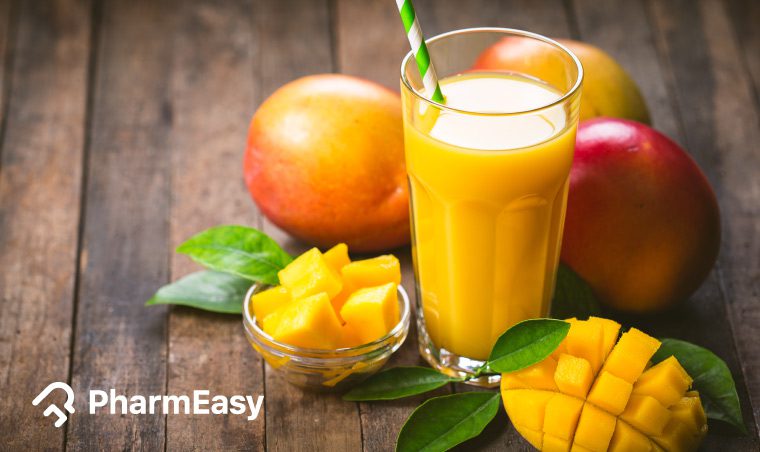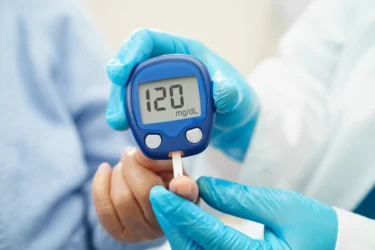Mango Juice: Uses, Benefits, Side Effects By Dr. Siddharth Gupta
By Dr Siddharth Gupta +2 more

Get,

to manage your symptom
Get your,


4 Cr+ families
benefitted

OTP sent to 9988776655



You’ve successfully subscribed to receive
doctor-approved tips on
Whatsapp

Get ready to feel your best.

Hi There,
Download the PharmEasy App now!!


Register to Avail the Offer
Send OTPBy continuing, you agree with our Privacy Policy and Terms and Conditions

Hi There,
Sign up on PharmEasy now!!
Trusted by 4 crore+ families

OTP sent to 9988776655



You have unlocked 25% off on medicines




Code: NU25
By Dr Siddharth Gupta +2 more
Table of Contents
Summer is the season when all hail the king of fruits the delicious mango. Loved by nearly all is can also be said to be irresistible. Grown mainly in tropical and subtropical regions, the mango tree is actually the national tree of Bangladesh and the fruit is the national fruit of both India and Philippines. Now you know why everyone desperately awaits summers and cant wait to sink in their teeth into the juicy yellow mangoes!
The scientific name of the species native to India and Southeast Asia is Mangifera indica L. and it belongs to the family Anacardiaceae. Given the huge demand, mango is also now being grown in Central America, Australia, Europe and Africa. It has been grown in India and Southeast Asia for around 4000 years and there are over one thousand varieties of mangoes, out of which only a few are being produced on a commercial scale1.

Mango has an exotic flavour, sweet taste and might even have numerous health benefits. It is consumed in both the ripe and unripe forms. Used for making pickles, chutneys, vinegar, desserts and beverages2 mango is one of the popular foods. Mango juice is also a popular refreshing beverage. The various nutrients present in it and the potential uses of mango juice for its health benefits are manifold. Read on to know more.
Mango juice contains a total energy of 52 Kcal. The nutritional value of mango juice is as follows:
| Nutrient | Percentage content |
| Carbohydrates | 13.6 |
| Sugars | 12.8 |
| Fibre | 0.8 |
| Potassium | 0.035 |
| Calcium | 0.005 |
| Sodium | 0.006 |
The following nutrients are also present in mango juice:
| Minerals | Vitamins |
| Zinc | Vitamin A |
| Manganese | Vitamin C |
| Phosphorous | Vitamin E |
| Calcium | Vitamin K |
| Iron | Folates |
| Copper | Vitamin B1 (niacin) |
| Magnesium | Vitamin B2 (riboflavin) |
| Vitamin B5 (pantothenic acid) | |
| Vitamin B6 (pyridoxine) |
Mango juice also contains alpha and beta carotene in it1.
Mango juice contains a ton of polyphenols in it like ellagic acid, isoquercetin, beta glucogallin, quercetin, gallotannins, mangiferin and gallic acid, which might be the reason for its potential health benefits we will elaborate on ahead.
Mango juice might have the following properties:
The various parts of mango might have a potential use for human health. Likewise, mango juice also might have the following potential uses.

Mango contains a compound called mangiferin which might have potential effects against diabetes. It was noted in animal experiments that mangiferin might have the potential to lower blood sugar level and the lipid levels (fats). Both of these might be helpful for people with diabetes. An increased number of cells which produce insulin was also observed. Mangiferin might play a role in the metabolism of glucose and insulin resistance. Therefore, mango juice might have the potential to help with diabetes. However, conditions like diabetes need to be properly treated by a doctor, thus, ensure that you consult a doctor2.

In an experimental model, it was observed that in diabetic rats having kidney issues, mangiferin was helpful. It was observed that mangiferin reduced the blood urea nitrogen levels and thus, it may help deal with kidney damage in humans. Thereby, mango juice might have a potential to help with kidney problems. These effects, however, need to be proved by further research2.

Several studies have shown that mango juice might have the potential to help deal with stomach related health conditions. As mango juice passes through the body, it was studied that one of its active components, mangiferin, was transformed into various phenolic compounds. These phenolic compounds might be beneficial against certain inflammatory diseases of the stomach. It might help the stomach against diseases like inflammatory bowel syndrome, gastric ulcers, ulcerative colitis, etc. Therefore, mango juice might exhibit gastroprotective property2.
In my experience, I have observed that mangoes are a good source of dietary fiber. Fiber plays a crucial role in the digestion process by aiding in the catabolism, or breakdown, of protein. By consuming mangoes, which are rich in fiber, you can support the efficient digestion and utilization of protein in your body. This can contribute to overall digestive health and nutrient absorption5.
Dr. Smita Barode, B.A.M.S, M.S.

The potential anti-inflammatory activity of mango was observed in relation to liver as well. It was seen in a variety of studies that the bioactive components of mango juice might help against liver inflammation, probably by interfering with lipopolysaccharide (LPS) and galactosamine activity. In another experiment it was seen that mango juice might also interfere with the inflammatory pathways. It might also help the liver against injury from carbon tetrachloride (a toxic chemical), as seen in a study conducted by Pokorski et al2.

Several studies were conducted on different extracts of mango against a variety of cancer cells. It was found that mango juice might have components that have a potential activity against pancreatic cancer, colonic cancer, breast cancer and colorectal cancer. However, there is a need for more studies to prove these effects. Moreover, you should consult a doctor for the proper diagnosis and treatment of cancer. So, ensure that you consult a doctor and do not self medicate2.

In an animal study, it was seen that the components of mango juice might potentially inhibit the dissolution (resorption) of bone. This activity was seen under a condition where the bone dissolution (resorption) was caused by imbalance of a hormone called the parathyroid hormone. Therefore, much more extensive research is required to fully understand the effects of mango juice on bones4.

The active components of mango juice might have the potential to neutralise the oxygen free radicals which cause oxidative stress, leading to cell damage and possibly chronic diseases. As it might have the potential to counterbalance the oxidative stress, it might possibly help against various diseases caused due to oxidative stress, like osteoporosis and liver diseases2.
Though there are studies that show the potential uses of mango juice in various conditions, but these are insufficient and there is a need for further studies to establish the true extent of benefits of mango juice on human health.
By including mango in your diet, you can potentially benefit from these protective effects and support the well-being of your eyes and related tissues. I have learned that mango, which is rich in vitamin A, plays a crucial role in maintaining good vision and protecting against muscular degeneration. Vitamin A promotes the efficient circulation of blood in the skin and mucus membranes, which can enhance their overall health and function5.
Dr. Siddharth Gupta, B.A.M.S, M.D (Ayu)
You can use mangoes to make fresh mango juice or consume pre-made mango juices available on the market. They are available in bottles, cans, or other packaged forms. To make fresh mango juice
You must consult a qualified doctor before taking any herbal supplements. Do not discontinue or replace an ongoing treatment of modern medicine with an ayurvedic/herbal preparation without consulting a qualified doctor.
There is a need for more research to explore the possible side effects of mango juice. It might cause allergies as different foods produce different reactions in individuals. Therefore, it is always better to consult a doctor before use.
Based on my experience, I have observed that both unripe and ripe mangoes contain a significant amount of vitamin C. Vitamin C has been found to help decrease the levels of LDL cholesterol in the body, which is often referred to as “bad” cholesterol5.
Dr. Rajeev Singh, BAMS
It is considered to be safe when taken in regular food quantities. However, it is better to consult a doctor if you are suffering from any condition, pregnant, breastfeeding or giving it to children in larger than usual quantities.
Also Read: Cranberry Juice: Uses, Benefits, Side Effects and More!
More studies are required to state the interaction of mango juice with any drug. It is advised that you consult a doctor before taking mango juice if you are under any medication.
Also Read: Apple Juice: Uses, Benefits, Side Effects and More!
Mango juice might have the benefits for the liver, kidney, stomach, etc. It might also be helpful in neutralising the oxidative stress and diabetes. However, these effects need to be proved by more research1,2,4.
Yes, mango juice might be good for health as it contains many nutrients and bioactive components in it1,4.
There are no reports claiming the effects of mango juice for hair.
There are no studies regarding the potential use of mango juice for healthy skin. Therefore, there is a requirement for more studies regarding this.
Disclaimer: The information provided here is for educational/awareness purposes only and is not intended to be a substitute for medical treatment by a healthcare professional and should not be relied upon to diagnose or treat any medical condition. The reader should consult a registered medical practitioner to determine the appropriateness of the information and before consuming any medication. PharmEasy does not provide any guarantee or warranty (express or implied) regarding the accuracy, adequacy, completeness, legality, reliability or usefulness of the information; and disclaims any liability arising thereof.
Links and product recommendations in the information provided here are advertisements of third-party products available on the website. PharmEasy does not make any representation on the accuracy or suitability of such products/services. Advertisements do not influence the editorial decisions or content. The information in this blog is subject to change without notice. The authors and administrators reserve the right to modify, add, or remove content without notification. It is your responsibility to review this disclaimer regularly for any changes.
Comments

Leave your comment...
You may also like
Comments